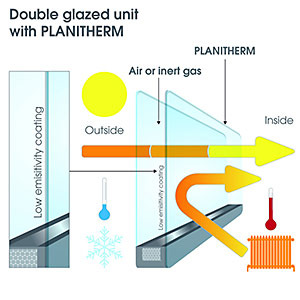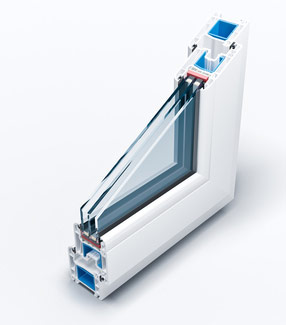One of the largest drains on businesses’ resources can be its energy bills. By adding the highly efficient protective layer to your buildings given by premium quality commercial glazing, energy bills can be reduced whilst retaining warmth and comfortable surroundings for your employees or guests.
What is an A rated window?
Energy ratings on window glass are rated from G through to A, with A being the highest level of energy efficiency. Many double glazed windows fitted over the last decade only have an E rating or lower. We will be delighted to assist your business by discussing the most cost-effective way of bringing your windows up to an A rating. This not only reduces costs on energy consumption but it also enables your business to boast a more effective environmental policy.
24-7 Glass and Glazing are delighted to install A rated windows within the window frames you wiah to have fitted in your business premises.
 One of the features that sets Planitherm glass apart from more conventional glazing is the way in which its advanced coating reflects warmth back into a room rather than allowing it to escape back out through the glass. This in turn means you need to use less energy in your office or business premises to meet the desired temperature.
One of the features that sets Planitherm glass apart from more conventional glazing is the way in which its advanced coating reflects warmth back into a room rather than allowing it to escape back out through the glass. This in turn means you need to use less energy in your office or business premises to meet the desired temperature.
An additional bonus of Planitherm glass is that it has been developed to almost completely eradicate problems with condensation which commonly arise in more conventional window glass.
 The only thing more energy efficient than having the right glass in double glazing is having the right glass in triple glazing. With the cavity filled with gas, Planitherm glass fitted in triple glazing achieves even greater protection for your building against heat and energy loss.
The only thing more energy efficient than having the right glass in double glazing is having the right glass in triple glazing. With the cavity filled with gas, Planitherm glass fitted in triple glazing achieves even greater protection for your building against heat and energy loss.
A greater amount of solar energy is captured in the first place and this is then combined with glazing to have better insulating properties. As less heat is allowed to escape, combined with the greater amount of heat extracted from the natural surroundings (sun), the savings and energy efficiency achieved is even greater than those attributed the A grade energy rating.
On K glass the coating is located on the inner panes surface, on the side pointing in toward the cavity of the insulating glass unit. The coating is deliberately designed so as not to be a good radiator of heat. That way the warmth is not transferred out to the colder outside pane and into the cooler outside air. Instead it is reflected back into your home or business premises interior. So put simply, it allows warmth in easily, but doesn’t let it escape so readily.
The energy efficient glass allows up to 78 % of the natural energy to get into your buildings interior. This is comprised of 66% which passes directly into your premises and a further 12% which is trapped in the window and eventually works its way through to the interior of your office or business premises.
Therefore when considering the reduction in costs on properties and business premises it is worth considering light as well as heat.
If safety glass is required in public places, schools, nurseries etc. then a toughened version of this product can also be provided.
How does argon gas help to keep my home insulated?
The ‘gap’ between the glass in a double glazed unit has to contain something – it is filled in an environment which naturally contains air and so one option is just to have a unit containing regular air. However, despite air providing moderate insulation there are some inert noble gases which do the job better.
One such gas is Argon. As well as being non-flammable, non-reactive and colourless, it also has no odour. Perhaps most importantly it provides the best insulation of the inert gases often used in sealed window units. The convection inside the space between the glass is slowed down. Some brands such as Pilkington K-Glass combine argon gas with a softcoat glass. We can install hardwood, aluminium or UPVC units with the added benefits that argon gas bring.
All sealed unit brands we install which make use of argon gas have passed BS EN1279 part 3 which is a test of the gas concentration within the sealed units and a measure of how much gas leaks out of the units. It needs to remain above 80% concentration in order for the insulation to remain effective. The standards set within EN1279 part 3 ensure that only units which leak less than 1% per year are deemed fit to pass.
Get In Touch Or
Call: 0800 996 1247 or 0121 476 0717.

